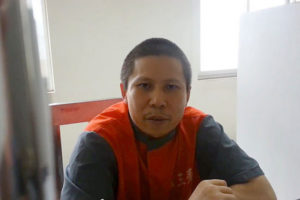XU ZHIYONG WAS until recently a lecturer at the Beijing University of Post and Telecommunications and is among China’s best-known human rights lawyers. He was awarded a PhD in law in 2002 from Peking University under the supervision of the famous legal scholar Zhu Suli 朱苏力. In the aftermath of the Sun Zhigang 孙志刚 incident (in which Sun, a young man, was beaten to death while in police custody in Guangzhou) in 2003 he was one of the three legal scholars who wrote to the National People’s Congress advocating the abolition of the system of Custody and Repatriation 收容遣送.
Together with the lawyer Teng Biao 滕彪, he founded Gongmeng 公盟 (The Open Constitution Initiative) in 2003. Originally called the Sunshine Constitutionalism Social Science Research Centre, Gongmeng promoted the rule of law and the protection of citizens’ constitutional rights. In 2009, the authorities forced the closure of Gongmeng and detained Xu on charges of tax evasion. Following his release, Xu and supporters continued advocating for the promotion and protection of human rights. They collectively called themselves ‘citizens’ 公民, a term that, according to Xu, encapsulates individual autonomy, freedom and individual social responsibility.
The New Citizens’ Movement emerged in May 2012 in the context of the promotion of the idea of a ‘New Citizens’ Spirit’, a concept of citizenship that holds individuals as being rights bearers against the state. According to Xu, citizens have legal and political rights and the basic inalienable freedoms of belief, thought, expression and life. Today, the movement claims approximately two hundred activists in thirty cities around China.
Xu was put under house arrest on 12 April 2013. He was formally detained on 16 July and arrested on 22 August that year. On 22 January 2014, the Beijing Number One Intermediate People’s Court sentenced him to four years in prison for ‘gathering a crowd to disrupt order in a public place’ (Article 291 of the Criminal Law) in a trial of first instance. The Beijing Higher People’s Court upheld the verdict on 11 April 2014.



